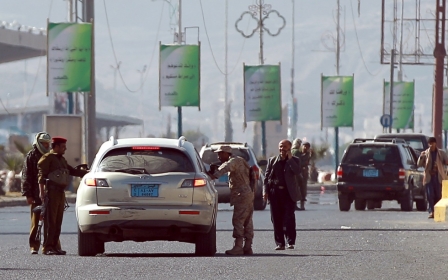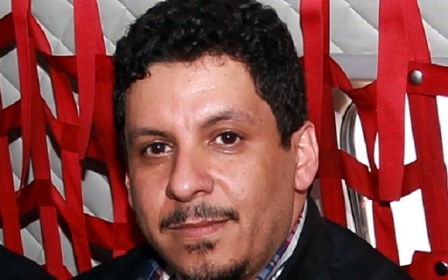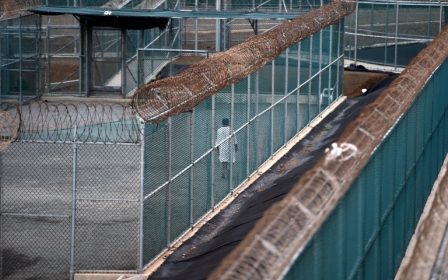Nine dead in Yemen as Houthi rebels surround PM's residence

A precarious ceasefire is in place in Yemen, after a heavy day of fighting which saw Houthi rebels attack a convoy carrying the Prime Minister Khalid Bahah.
Bahah was fired upon after leaving the home of President Abdrabuh Mansur Hadi, in a move that is being widely seen as the biggest challenge yet to the embattled leader.
While Bahah escaped unharmed, nine people were killed and at least 14 wounded in the clashes that subsequently broke out near the presidential palace, as well as other parts of Sanaa, medical sources said.
Late on Monday night armed fighters loyal to the Houthis had surrounded Bahah's residence, government spokesman Rajih Badi said.
The spokesman called for "an urgent meeting" of all political forces in on Tuesday morning in order to create a "roadmap" aimed at ending the violence.
Shelling and gunfire could be heard throughout the day as smoke rose over parts of the city, and residents fled many neighbourhoods. Medics said at least nine people were killed and that the Houthis had seized an army base near the presidential palace and taken control of state media.
For now, the ceasefire – which was called for by the Arab League - seems to be holding but tensions remain high with uncertainly rife about what the coming days may bring.
Information Minister Nadia Sakkaf, told Al-Jazeera shortly before the ceasefire – whose details are yet emerging – that “no single party was in control of Sana’a” and that there were soldiers who were choosing to ignore their orders.
We might see a "a new Yemen by the end of the day, maybe a new system altogether,” she said, while also warning that the clashes and growing rift between the two sides may allow al-Qaeda in the Arabian Peninsula (AQAP) to further cement its control over parts of the country.
“I'm very worried that al-Qaeda or other terror organisations will use the lack of order and target anybody," she said.
So far, the Houthis and those loyal to Hadi have pointed fingers at each other. While a security official said the army intervened when the Houthis began to set up a new checkpoint near the presidential palace, a prominent Houthi chief, Ali al-Imad, accused the presidential guard of provoking the clashes.
"Hadi's guard is trying to blow up the situation on the security front to create confusion on the political front," he said on his Facebook page.
Information Minister Nadia Sakkaf also said that the convoy of the Houthi representative "came under fire", but she did not elaborate.
Officials reported that the Houthis, went on to seize control of state media, further tightening their hold on Sana’a.
"Yemeni satellite channel is not under state control, nor is state news agency Saba. The Houthis have completely controlled them and are refusing to publish any government statements," Sakkaf wrote on Twitter.
The Houthis also said they had seized an army base on a hill overlooking the palace.
Monday's unrest came after Hadi's chief of staff Ahmed Awad bin Mubarak was abducted on Saturday as the Houthis pressed for concessions in the writing of a new constitution, headed by Mubarak.
Mubarak is in charge of a "national dialogue" set up after veteran strongman Ali Abdullah Saleh was forced from power in February 2012 following a year of bloody Arab Spring-inspired protests.
The Houthis said they had seized the top aide to prevent the violation of a UN-brokered agreement they reached with Hadi last year, which provided for the formation of a new government and the appointment of Houthi advisers to the president.
The Shiite rebels first overran the capital back in September, after weeks of fighting. While they were able to take over many government buildings they stopped short of staging an outright coup, instead demanding a string of concessions from Hadi, such as reinstating fuel subsidies and the appointment of a new prime minister and a new government.
It stipulated that in return the Houthis would withdraw from key state institutions they had seized.
Mubarak's kidnapping came just before a meeting of the national dialogue secretariat to present a draft constitution dividing Yemen into a six-region federation, which the Houthis oppose.
The rebels, who hail from Yemen's remote north and fought a decade-long war against the central government, rejected the decentralisation plan last year, claiming it divides the country into rich and poor regions.
Mubarak was also a key player in the dialogue of the separatist Southern Movement, which seeks autonomy or secession for Yemen's formerly independent south.
On Sunday, the governor of Shabwa warned that oil companies operating in the southern province would turn off the taps if the Houthis failed to release him.
A southern official confirmed Monday that workers at three oil fields producing around 50,000 barrels per day in Shabwa and at the Balhaf gas terminal had walked out at midnight.
The official warned of "further escalations" to press the Houthis to release Mubarak.
New MEE newsletter: Jerusalem Dispatch
Sign up to get the latest insights and analysis on Israel-Palestine, alongside Turkey Unpacked and other MEE newsletters
Middle East Eye delivers independent and unrivalled coverage and analysis of the Middle East, North Africa and beyond. To learn more about republishing this content and the associated fees, please fill out this form. More about MEE can be found here.




